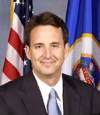Would Pawlenty Deliver Minnesota to McCain As VP Nominee?

Minnesota Republican Governor Tim Pawlenty has been one of just a handful of names floated by the media and Republican strategists over the past year as a potential Vice Presidential running mate to John McCain. The national attention on Pawlenty is significant and unusual. Pawlenty’s credentials for being added to McCain’s ticket are many, but primarily center on: (1) His outspoken support for McCain through thick and thin during the 2008 campaign, (2) His 2006 win in a purple state when many Republicans lost (buoyed by his broad appeal to conservatives, moderates and some Democrats); (3) He adds a youthful face to the 2008 GOP ticket; and (4) He could help Republicans steal a state that Democrats depend on in November.
A big question is whether a McCain/Pawlenty ticket would carry the Gopher State. Recent history is well known: Pawlenty has been unable to win majorities in his 2002 and 2006 gubernatorial election bids (he received 44 percent and 47 percent, respectively). Going back further in history, there is a notable pattern of Vice Presidential nominee’s struggling to win their home states.
In 25 presidential elections during the past 100 years since 1908, the presidential tickets have not carried the running mate’s home state in 19 instances (38 percent). The most recent example is Democrat John Edwards who failed to carry North Carolina for John Kerry in 2004.
Of the 31 instances in which the running mate won their home state, more than two-thirds were in states that the VP’s party had already won during the previous presidential election. For example, VP nominee Dick Cheney and George W. Bush won Wyoming in 2000, but Republicans had already carried the Cowboy State in every presidential election year since Richard Nixon’s victory in 1968.
A McCain/Pawlenty ticket would therefore be bucking history — only 10 of 50 races (20 percent) since 1908 saw a ticket win the VP’s state after the party had lost the state in the previous election. This has happened to the benefit of 5 Republican and 5 Democratic tickets. Some notable examples:
- In 1992, the Clinton-Gore ticket won Gore’s home state of Tennessee by 5 points over George H. W. Bush (with the help of Ross Perot); Bush had won the Volunteer state by 16 points in 1988.
- In 1980, the Reagan-Bush ticket won Bush’s home state of Texas by 14 points over Jimmy Carter; Carter had won the Lone Star State by 3 points in 1976.
- In 1976, the Carter-Mondale ticket won Mondale’s home state of Minnesota by 13 points over Gerald Ford; Richard Nixon had won the Gopher State by 6 points in 1972.
- In 1960, the JFK-LBJ ticket won Johnson’s home state of Texas by 2 points over Nixon; the Eisenhower-Nixon ticket had won Texas by 11 points in 1956.
However, selecting a Vice-Presidential nominee has also coincided with the loss of a VP’s home state in 6 elections (12 percent) that their party had won in the previous election (3 each for Republicans and Democrats). Some notable examples:
- Democratic VP nominee R. Sargent Shriver lost his home state of Maryland with George McGovern by 24 points in 1972; 4 years earlier Hubert Humphrey won the state by 2 points.
- Republican Henry Lodge lost his home state of Massachusetts with Richard Nixon by 21 points in 1960; in 1956 Eisenhower and Nixon had won the state by 19 points—a 40-point turnaround.
To Pawlenty’s advantage, he is coming off two straight statewide election gubernatorial victories and has enjoyed approval and favorability ratings in the mid- to low 50s throughout most of his more than 5 years in office.

“…with the ‘help’ of Ross Perot…” The overwhelming general consensus is that Perot drew evenly from both majors, or even that he siphoned a bit more from the D line than the R line. Of course, there is no way to know for sure since Instant Runoff Voting was not used in either ’92 or ’96, in TN or anywhere else. Barring an injunction placed by the federal judiciary, the state of ME will inform all concerned the secondary preference of the Green, Libertarian, and other non major party supporters later this year, thereby ending all these conjectures and presumptions.